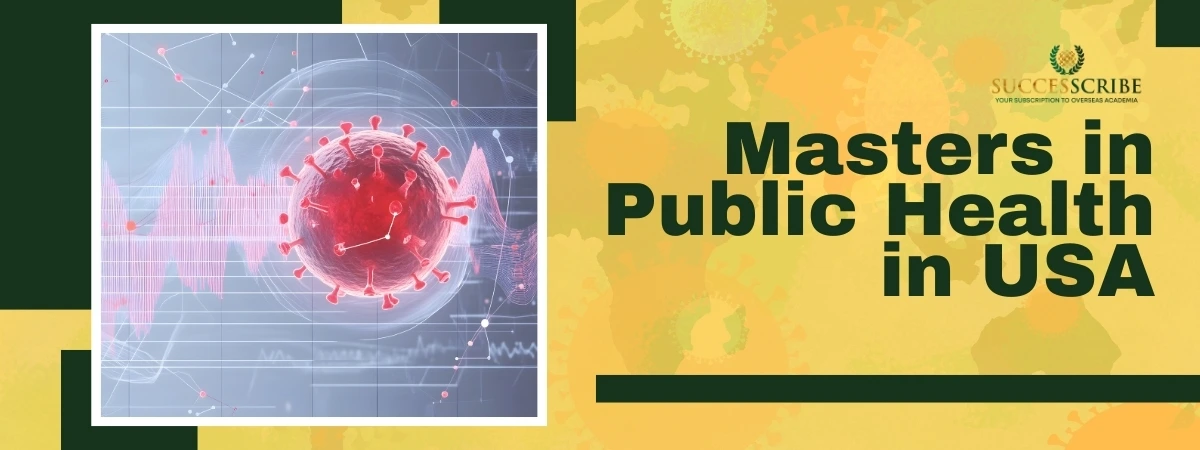The Master of Public Health (MPH) degree has emerged as one of the most sought-after graduate programs in the United States, attracting students from around the world who aspire to make meaningful contributions to community health, disease prevention, and health policy. As global health challenges continue to evolve, the demand for skilled public health professionals has reached unprecedented levels, making this an opportune time to pursue advanced education in this field.
The United States hosts over 400 accredited MPH programs, offering students access to world-class faculty, cutting-edge research facilities, and diverse practical experiences. With approximately 17,000 applications submitted annually to MPH programs across the country, competition remains strong, yet opportunities for qualified candidates are abundant.
Key Highlights – Masters in Public Health in USA
- What is an MPH?
- Top Universities for Master’s in Public Health (MPH) in the USA
- Common MPH concentrations (with typical career outcomes)
- Accreditation: Why CEPH matters ?
- Career Opportunities and Salary Prospects
- Admission Requirements for Masters in Public Health in USA
- Cost of Studying Master’s in Public Health (MPH) in the USA
- Conclusion
- FAQs
What is an MPH?
A Master of Public Health is a professional graduate degree designed to equip students with the knowledge, skills, and competencies needed to address population-level health challenges. Unlike clinical degrees that focus on individual patient care, MPH programs train professionals to think broadly about health at the community, national, and global levels.
The degree emphasizes five core disciplines recognized by the Council on Education for Public Health (CEPH):
- Epidemiology – The study of disease patterns and health outcomes in populations
- Biostatistics – Application of statistical methods to analyze health data
- Environmental Health Sciences – Assessment of environmental factors affecting human health
- Health Policy and Management – Development and implementation of health policies and program management
- Social and Behavioral Sciences – Understanding social determinants of health and health behaviors
Want to Study in Europe?
Start your journey with Successcribe’s free expert guidance
Book a Free Session NowTop Universities for Master’s in Public Health (MPH) in the USA
Choosing where to earn your Masters in Public Health in USA is critical, as top-tier universities like Johns Hopkins and Harvard provide unparalleled research opportunities and connections to leading health organizations.
The right university for your MPH degree is crucial because it directly impacts your research exposure, networking opportunities, internship pipelines, faculty expertise, and global career prospects. The USA hosts some of the world’s most renowned public health institutions, many of which rank in the top tier globally due to their strong academic reputation, cutting-edge research output, and partnerships with leading public health organizations like the CDC, WHO, NIH, and state health departments.
| University / School Name | Location | Type | Defining Strengths & Specialties | Estimated Annual MPH Tuition |
| Johns Hopkins University (Bloomberg School of Public Health) | Baltimore, MD | Private | World’s largest and first SPH; unparalleled research in Global Health, Epidemiology, and Biostatistics. Offers accelerated 11-month and flexible online options. | $80,000 |
| Harvard University (T.H. Chan School of Public Health) | Boston, MA | Private | Exceptionally strong in Health Policy and Management, Global Health, and Social/Behavioral Sciences. Located in a major academic hub. | $75,000 |
| Emory University (Rollins School of Public Health) | Atlanta, GA | Private | Direct proximity and strong ties to the Centers for Disease Control and Prevention (CDC), making it ideal for Infectious Disease and Applied Epidemiology. | $73,500 |
| University of North Carolina – Chapel Hill (Gillings School of Global Public Health) | Chapel Hill, NC | Public | Top-ranked public institution; noted for Environmental Health, Maternal & Child Health (MCH), and offering strong value, particularly for in-state residents. | $24,000 |
| Columbia University (Mailman School of Public Health) | New York, NY | Private | Excellent urban health focus; strong in Environmental Health, Epidemiology, and connections to the UN for Global Health. | $71,000 |
| University of Michigan – Ann Arbor (School of Public Health) | Ann Arbor, MI | Public | Highly regarded for Biostatistics, Health Behavior & Education, and the Interdisciplinary nature of its programs. | $51,500 |
| University of Washington (School of Public Health) | Seattle, WA | Public | Strong focus on Global Health, Biostatistics, and Environmental & Occupational Health, with deep connections to the Bill & Melinda Gates Foundation. | $43,000(Out-of-State) |
| Boston University (School of Public Health – SPH) | Boston, MA | Private | Flexible, modular curriculum with a strong emphasis on Health Law, Policy, and Management. High post-graduate salary outcomes for its graduates. | $64,000 |
| University of California – Los Angeles (UCLA) (Fielding School of Public Health) | Los Angeles, CA | Public | Leading California program, strong in Health Policy and Systems, Community Health, and addressing diverse, urban populations. | $36,500(Out-of-State) |
| University of California – Berkeley (UCB) (School of Public Health) | Berkeley, CA | Public | Known for its history of social justice advocacy, strong in Environmental Health Sciences, and Health Policy within the UC system. | $22,200 (In-State) |
Apply to Top European Universities
Make your application simple and stress-free with Successcribe
Get Expert Help NowOther Highly Regarded and Specialized MPH Programs
Beyond the top 10, several other universities offer specialized or high-value MPH programs that are excellent choices based on focus and cost.
| University | Location | Notable Specialization / Value Factor |
| George Washington University (GWU) | Washington, D.C. | Top-tier for Health and Biomedical Data Science and deep exposure to Global Health Policy due to D.C. location. |
| Tulane University | New Orleans, LA | Oldest SPH in the US. Only combined School of Public Health and Tropical Medicine; strong in global health and domestic rural health. |
| Yale University | New Haven, CT | Known for smaller class sizes, intense research, and Chronic Disease Epidemiology. High academic prestige. |
| University of Minnesota | Minneapolis, MN | Excellent, affordable public option with strengths in Epidemiology and Maternal and Child Health (MCH). |
| Brown University | Providence, RI | Excellent, growing, and highly selective school focusing on Health Services Research and Policy. |
| University of Pittsburgh | Pittsburgh, PA | Strong in Environmental Health and Epidemiology; a highly research-active public institution offering good value. |
Common MPH concentrations (with typical career outcomes)

MPH programs offer numerous specializations that allow students to tailor their education to specific career goals. The most popular concentrations for 2026 include:
1. Epidemiology
Focuses on studying disease patterns, outbreak investigation, and surveillance systems. Specializing in Epidemiology during your Masters in Public Health in USA prepares you for high-growth careers in outbreak investigation and disease surveillance.
Epidemiologists are experiencing rapid job growth, with a projected 16% increase from 2021 to 2031, significantly faster than the average for all occupations.
Career outcomes:
- Median salary: $78,830 annually
- Top employers: CDC, state health departments, pharmaceutical companies
- Job growth rate: 19% through 2033
2. Biostatistics
Involves applying statistical methods to analyze public health data and inform evidence-based decision-making.
Career outcomes:
- Median salary: $72,800-$144,770 depending on sector
- Research and development positions command the highest salaries
- High demand in both academic and industry settings
3. Global Health
Prepares students to address health challenges affecting populations worldwide, with emphasis on health equity and international development.
Career opportunities:
- International organizations (WHO, UNICEF)
- Global NGOs and foundations
- Government foreign aid programs
- Average salary: $70,000-$95,000
4. Health Policy and Management
Focuses on healthcare systems, policy development, and organizational leadership.
Career outcomes:
- Medical and Health Services Managers: $101,340 median annual salary
- Health Policy Analysts: $80,000-$110,000
- Growing demand due to healthcare reform initiatives
5. Environmental Health
Addresses environmental factors affecting human health, including pollution, climate change, and occupational hazards.
Career outcomes:
- Environmental Health Specialists: $76,480 median salary
- Increasing focus on climate change and health
- Opportunities in government agencies and consulting firms
6. Community Health Sciences
Emphasizes health promotion, disease prevention, and community engagement strategies.
7. Social and Behavioral Sciences
Examines social determinants of health and designs interventions to promote healthy behaviors.
8. Maternal and Child Health
Focuses on improving health outcomes for women, children, and families.
9. Health Informatics and Data Science
Emerging field combining public health with technology and data analytics.
10. Infectious Disease Control
Particularly relevant post-COVID-19, focusing on disease surveillance and outbreak response.
Accreditation : Why CEPH matters
CEPH (Council on Education for Public Health) is the primary U.S. accreditor for public health programs. Graduating from a CEPH-accredited program can be important for some jobs and for certain credentialing pathways. The CEPH published list of accredited schools/programs is the authoritative source.
ceph.org
Practical tip: On every program page, check whether the degree (school or program) is CEPH-accredited and the accreditation end date – CEPH posts an updated searchable list.
Career Opportunities and Salary Prospects

The return on investment for a Masters in Public Health in USA is clear, with graduates experiencing a 99% employment rate and strong salary prospects across various sectors.
Job Market Overview
The employment landscape for MPH graduates is exceptionally strong. According to the Bureau of Labor Statistics:
- 54,700 annual job openings expected for medical and health services managers over the next decade
- 13% overall growth projected for healthcare occupations from 2021 to 2031
- 99% employment rate for MPH graduates from top programs within one year of graduation.
Salary Expectations by Role
| Job Title | Entry-Level Salary | Mid-Career Salary | Senior-Level Salary |
| Epidemiologist | $55,000 – $65,000 | $78,000 – $95,000 | $110,000 – $150,000 |
| Biostatistician | $60,000 – $75,000 | $85,000 – $120,000 | $130,000 – $175,000 |
| Health Policy Analyst | $50,000 – $65,000 | $75,000 – $100,000 | $110,000 – $145,000 |
| Public Health Program Manager | $55,000 – $70,000 | $80,000 – $105,000 | $115,000 – $150,000 |
| Health Educator | $40,000 – $50,000 | $60,000 – $75,000 | $85,000 – $110,000 |
| Environmental Health Scientist | $48,000 – $60,000 | $70,000 – $90,000 | $100,000 – $135,000 |
| Health Services Manager | $65,000 – $85,000 | $95,000 – $120,000 | $140,000 – $185,000 |
| Global Health Specialist | $50,000 – $65,000 | $75,000 – $100,000 | $110,000 – $150,000 |
Average Overall MPH Salary:
- Recent graduates: $68,000 – $70,000 annually
- Mid-career professionals: $90,000 – $121,000
- Experienced professionals: $120,000 – $150,000+
- Top earners: $175,000 – $233,000+
Salary by Industry and Sector
Salaries for MPH graduates vary widely based on the sector of employment. In 2025, the highest-paying opportunities are found in the private and consulting sectors, where quantitative skills command a premium.
| Employment Sector | Average Annual Salary Range for MPH Holders | Typical Roles |
| Private Sector (Pharma/Biotech/Tech) | $95,000 – $140,000+ | Senior Biostatistician, Regulatory Affairs Specialist, Health Data Scientist, Health Consultant. |
| Consulting | $90,000 – $135,000 | Management Consultant (Healthcare Strategy), Public Health Program Evaluator. |
| Healthcare/Hospitals | $75,000 – $110,000 | Health System Manager, Quality Improvement Coordinator, Infection Control Practitioner. |
| Government (Federal/State) | $65,000 – $95,000 | Epidemiologist (CDC/NIH), Health Policy Analyst, Program Director. |
| Non-Profit / NGO (Domestic & Global) | $55,000 – $80,000 | Program Coordinator, Global Health Field Manager, Community Health Director. |
Geographic Salary Variations
Location significantly impacts earning potential:
| State/City | Average MPH Salary |
| New York, NY | $122,201 |
| California (Bay Area) | $115,000 – $158,000 |
| Maryland | $115,000 – $125,000 |
| Virginia | $109,040 |
| Massachusetts | $105,000 – $120,000 |
| Nebraska | $110,488 |
| Texas | $85,000 – $105,000 |
| Florida | $75,000 – $95,000 |
Admission Requirements for Masters in Public Health in USA
Admission to a Master’s in Public Health (MPH) program in the United States is competitive, especially in top public health schools like Johns Hopkins, Harvard, Columbia, and Emory. Although requirements vary slightly by university, the core criteria remain consistent across accredited MPH programs.
Academic Qualifications
- A Bachelor’s degree from a recognized university (any discipline is accepted – science, arts, commerce, medicine, psychology, engineering, etc.).
- Most universities expect a minimum GPA of 3.0 on a 4.0 scale (approx. 75–80%).
- Applicants with a background in health sciences, life sciences, medicine, pharmacy, nursing, biotechnology, or psychology may have an advantage, but it is not mandatory.
English Language Proficiency (For International Students)
You must submit valid English test scores:
| Test | Minimum Score Requirement |
| IELTS | 6.5 – 7.0 overall |
| TOEFL iBT | 90 – 100 |
GRE Requirement
- Most MPH programs in the USA have made the GRE optional or completely waived.
- However, some universities may request GRE scores for applicants with weak academic backgrounds.
- If submitted, a 310+ score is generally considered competitive.
Application Materials
- Official Transcripts – From all post-secondary institutions attended
- Statement of Purpose – 500-1,000 words explaining motivation, goals, and fit
- Letters of Recommendation – Typically 2-3 from academic or professional sources
- Resume/CV – Highlighting relevant experience
- Supplemental Essays – Some programs require additional written responses
- Application Fee – Generally $75-$100 (waivers available for qualifying applicants)
- Passport copy
- Academic transcripts
- Financial proof (for I-20 issuance after admission)
Typical applicant profile: Admissions committees look for relevant experience (public health, research, clinical, policy work), strong letters, clarity of purpose, and quantitative preparedness (many programs expect comfort with statistics).
Cost of Studying Master’s in Public Health (MPH) in the USA

The United States is home to some of the best public health institutions in the world, but pursuing an MPH degree here requires careful financial planning. The total cost of studying MPH in the USA includes tuition fees, living expenses, health insurance, books, student services, and miscellaneous personal costs. The financial commitment for a Masters in Public Health in USA varies significantly, with total costs ranging from affordable public university options to premium private institutions.
1. Tuition Fees for MPH in the USA
Tuition fees are the largest component of the total cost. MPH tuition varies widely depending on whether a university is public or private, as well as the student’s residency status.
| Type of University | Annual Tuition Fee (Approx.) |
| Public Universities (In-State) | $22,000 – $35,000 per year |
| Public Universities (Out-of-State) | $32,000 – $55,000 per year |
| Private Universities | $48,000 – $80,000 per year |
2. Cost of Living in the USA for MPH Students
Living costs depend heavily on the city. For example, Boston, New York, and San Francisco are expensive, whereas cities like Chapel Hill, Ann Arbor, and Atlanta are more affordable.
| Expense Type | Estimated Cost (per month) |
| Accommodation | $900 – $2,000 |
| Food | $350 – $600 |
| Transport | $80 – $150 |
| Utilities & Internet | $150 – $250 |
| Personal Expenses | $150 – $300 |
| Health Insurance Costs (Mandatory) | $1,600 – $4,000 per year |
| Books & Supplies | $800 – $1,500 |
| Annual Student Service Fees | $500 – $1,200 per year |
3. Cost Comparison: Affordable vs Premium MPH Universities
| Category | Annual Total Cost | Examples |
| Most Affordable | $40,000 – $60,000 | UNC Chapel Hill, University of Michigan, UC Berkeley (in-state), University of Washington |
| Mid-Range | $60,000 – $90,000 | Emory University, Boston University |
| Premium/Top-Tier | $95,000 – $1,10,000+ | Harvard, Johns Hopkins, Columbia |
Conclusion
Earning a Masters in Public Health in USA is a transformative investment for students passionate about health equity, data-driven policy, and global well-being, offering the opportunity to lead impactful careers in the evolving health sector.
The ideal MPH candidate is not just a high-achieving student but a curious, systems-level thinker who is passionate about justice, equity, and using data-driven approaches to solve our most pressing health challenges. For the 2026 applicant, the path is clear: conduct thorough research on programs and specializations, build a strong professional and academic profile, craft a compelling narrative in your application, and strategically plan your finances.
FAQs
What is the job placement rate for top MPH programs?
92–98% employed within 6 months of graduation at top-10 schools.
Which MPH specializations qualify for the 3-year STEM OPT extension?
Epidemiology, Biostatistics, Environmental Health Sciences, Health Informatics, and Data-focused tracks are almost always designated STEM.
Is prior work experience mandatory for admission?
While not strictly mandatory for all programs, 1 to 2 years of relevant work experience is highly recommended and often expected by top schools. Experience in research, a clinical setting, non-profit work, or public service (e.g., Peace Corps) significantly strengthens your application by demonstrating your understanding of public health challenges and professional commitment.
What is CEPH accreditation and why is it important?
CEPH stands for the Council on Education for Public Health. It is the sole accrediting body for public health schools and programs in the US. Attending a CEPH-accredited program ensures:
1. The curriculum meets national quality standards (including the “Five Core Disciplines”).
2. You are eligible to sit for the CPH (Certified in Public Health) exam.
3. Your degree is recognized by federal and state employers (like the CDC or local health departments).
Are scholarships available for MPH programs in the USA?
Yes. Many universities offer:
1. Merit-based scholarships
2. Need-based grants
3. Graduate assistantships
4. Research assistantships
External funding like Fulbright Scholarships is also available for international students.
Related Post
Masters in physiotherapy in USA
Masters in project management in USA
Masters in health informatics in USA
Masters in health administration in USA















